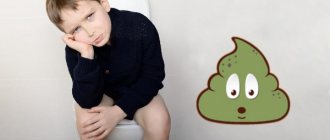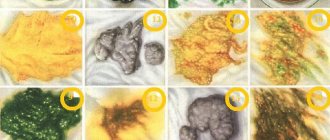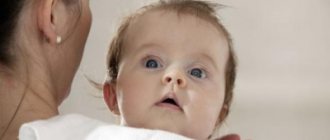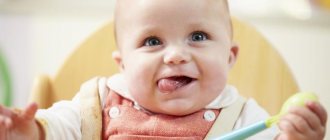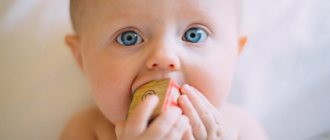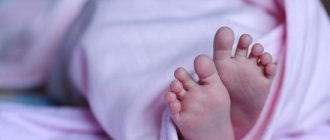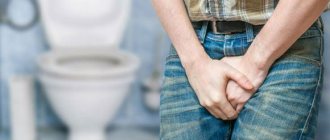Every mother is concerned about the well-being of her child. The state of health can be judged by many factors, one of which is stool. Diarrhea in newborns is a common occurrence and is associated with various factors. The main thing is to recognize the signs in time and prescribe adequate therapy, because sometimes more serious disorders lie behind this condition. In this regard, every parent should know what can cause diarrhea in a baby.
Diarrhea in a newborn is an extremely unpleasant phenomenon
Diarrhea in a baby
Diarrhea, or diarrhea, is loose stool that occurs more than twice a day. Diarrhea is not a disease, just a sign of some other more serious pathology. Doctors distinguish 6 main types of diarrhea:
- Alimentary diarrhea. The reason for the appearance of this condition is associated with the child’s poor diet, as well as allergic reactions to medications or some foods.
- Infectious diarrhea. The etiology of diarrhea is associated with infectious diseases, for example, dysentery, salmonellosis, toxic infection, etc.
- Toxic diarrhea. Occurs, as a rule, when the body is poisoned with inorganic substances (arsenic, mercury, etc.).
- Dyspeptic diarrhea. The reason for its occurrence is insufficient production of certain enzymes by the baby’s body.
- Drug-induced diarrhea. It is diagnosed in a child after taking certain medications (antibiotics, sulfonamides, nitrofurans) that affect the intestinal flora.
- Non-congenital diarrhea. The cause of its occurrence is the problematic regulation of intestinal motor activity. That is, diarrhea in this case may occur due to fear or severe anxiety.
About the disease
Diarrhea is not an independent disease.
This condition occurs as a result of damage to the intestines by toxins, bacteria, viruses, which is accompanied by a disruption of its normal function with increased bowel movements. There is a concept of acute (before 14 days) and chronic (after 14 days) diarrhea. It is worth noting that this symptom poses a serious danger to the health of children, especially young children (up to 3 years). Due to frequent watery bowel movements, the child’s body loses a lot of fluid, micro- and macroelements. Against the background of such a deficiency, pathological changes in the functioning of the baby’s brain, heart and kidneys develop very quickly. In the absence of timely treatment, seemingly ordinary diarrhea can cause death. Therefore, in third world countries, diarrhea occupies a leading position in the structure of infant mortality.
Mechanism of development of diarrhea
Intestinal epithelial cells produce special mucus, which includes mucopolysaccharides. They protect the intestinal mucosa from the effects of pathogenic microbes. Infectious agents destroy the structure of epithelial cells, so they become more vulnerable. To restore normal functioning of the gastrointestinal canal, the child’s body begins to produce more fluid, which helps remove toxins from the body.
Important! Only a pediatrician can know all the signs of incipient diarrhea. Only he can, with 100% probability, distinguish diarrhea from the baby’s normal physiological stool.
Symptoms of diarrhea in newborns
When changing a diaper, you need to pay attention to its contents. The nature of the stool can tell a lot about the health of the baby. Symptoms of diarrhea in infants can be different:
- Foam and blood in the stool are a key sign of the development of infection in the body. Additional symptoms in this case include redness of the skin, abdominal pain, fever and vomiting.
- Frequent bowel movements with white spots and undigested pieces of food may indicate that the child is overeating.
- Diarrhea of changed color and structure that occurs after feeding may be a reaction to complementary foods.
- Diarrhea with foam and mucus impurities indicate the presence of an allergic component. Skin rashes may appear.
- Defecation of contents with foam occurs when infected with staphylococcal enterocolitis.
- Feces of altered consistency, but without pathological impurities, indicate teething. An increase in body temperature up to 38 ° C, hypersalivation and swelling of the gums are possible.
- Liquid stool, in which mucus, foam and streaks of blood are detected, may indicate the development of dysbiosis, which is caused by antibiotic therapy.
Clinical examination of the child
Which stool is a deviation from the norm?
In the first days of life after the birth of a child, meconium (original feces) comes out of the intestines. This substance has a viscous consistency. If meconium still continues to pass on the 3rd day, you need to tell your pediatrician about this, as this may be a sign of intestinal atresia - improper development of one or more sections of the intestinal tube. Against the background of this pathology, intestinal obstruction develops.
Under normal conditions, stool has a mushy, yellow consistency. In the early stages of postembionary development, the immature digestive system does not always fully cope with its functions, so there may be small curdled inclusions and clots of transparent mucus in the feces.
Another indicator of the normal functioning of the digestive system is the frequency of bowel movements. During breastfeeding, a baby may poop after each feeding and even sometimes during the feeding. This is absolutely normal and is due to two factors: firstly, the newborn’s intestines are not yet fully formed, and secondly, the sucking process itself is slightly relaxing.
Artificial complementary feeding inevitably affects the structure of feces. The stool becomes darker and may contain brownish or greenish inclusions. This is due to the fact that iron is often added to the formula, this helps to avoid anemia in newborns.
How to recognize diarrhea
The following symptoms will help identify diarrhea in your baby:
- deterioration or lack of appetite;
- increased frequency of bowel movements;
- the appearance of impurities of blood, mucus, foam and water in the stool;
- increased gas formation;
- colic;
- the appearance of a putrid smell of feces;
- weight loss;
- temperature increase.
Constipative diarrhea is characterized by loose stools with mucus
Urgent Care
While the doctor has not yet arrived, parents cannot hesitate - they must adjust the diet and replenish the fluid lost by the child due to diarrhea:
- If the form is weak, you need to give the child a lot to drink. The child should drink after each visit to the toilet. If the liquid you drink causes vomiting, you should drink another portion, but in small sips and with pauses. But food should be limited.
- In severe cases, the child should also be provided with plenty of fluids. Bed rest, a special diet and calling a doctor are recommended if the stool does not begin to normalize within two days.
Add electrolytes to the water - this will help the body restore the minerals it needs much faster.
Causes of diarrhea in a baby
Diarrhea in a newborn can occur for various reasons. This condition is not always associated with infection. Most often, diarrhea in infants is provoked by physiological changes in their body.
If the baby begins to defecate with watery stools without accompanying symptoms, then you need to think about the etiology of this condition. There are many reasons that cause diarrhea. The main ones will be presented below.
The child does not need to be overfed, as this can provoke the development of many undesirable phenomena.
Errors in nutrition
Infants may experience intolerance to certain foods or their components, resulting in intestinal disorders in the form of diarrhea. This intolerance concerns the nutrition of a nursing mother. Very often there is an intolerance to cow's milk proteins, as well as gluten, a protein that is part of cereals. Constant consumption of such products by the mother leads to prolonged diarrhea in the child, the results are weight loss, allergic manifestations, flatulence, abdominal pain and, accordingly, general anxiety.
For your information. This condition, as a rule, does not require any special therapy. When you exclude the product from the diet, all manifestations go away. But determining which particular product causes intestinal dysfunction is very difficult.
Frequently changing breasts during feeding leads to the fact that the baby sucks only the front milk, without reaching the hind milk. In the absence of hindmilk, foremilk cannot be digested normally, since hindmilk contains lactulose, a special enzyme for digesting milk sugar. As a result, foremilk passes through the gastrointestinal tract too quickly and is not digested properly, causing stools that are noticeably loose and greenish in color.
Infection
The etiology of diarrhea is often associated with an infectious component. In such cases, diarrhea usually begins abruptly, accompanied by pronounced abdominal pain, fever, and vomiting, usually multiple times. Green diarrhea may appear in a newborn with streaks of blood, as well as mucus and foam. In this case, it is better to hospitalize the child.
Prevention
The best treatment is prevention. To avoid the occurrence of bacterial diarrhea, it is necessary to take care of prevention methods in advance. The most effective include:
- eating proven products with “good” expiration dates;
- refraining from purchasing products of animal origin at spontaneous markets;
- compliance with the rules of heat treatment of products;
- store food according to temperature conditions;
- drinking good quality water;
- compliance with recommendations regarding personal hygiene;
- It is necessary to wash all vegetables and fruits, as well as packaged products brought from the store.
Bacterial diarrhea is a common pathology regardless of age. To avoid the occurrence of the disease, it is recommended to adhere to preventive measures. If you do become infected, you must immediately contact a specialist to verify the diagnosis and choose treatment tactics. Timely therapy is the key to preventing complications.
What should parents do if their baby has diarrhea?
Every mother should clearly know what can cause diarrhea in her baby, and what needs to be done in this situation. After each bowel movement, the mother should wash the baby well. Doctors in this case do not recommend using wet wipes, as they can provoke the development of allergies in the baby. Drug therapy is prescribed to a child only after a diagnosis has been made by a doctor.
First aid for diarrhea in a child
If the child is diarrhea without vomiting, then the young mother should try to stop the diarrhea by putting the baby to the breast as often as possible. The fact is that in this way the baby will be able to get both drink and food. Pediatricians allow children to be given Smecta or Enterosgel for diarrhea. The mixture should be given in small portions every 15-20 minutes. You can also use chamomile infusion. It has an anti-inflammatory effect. In case of elevated temperature, before the doctor arrives, you can give an antipyretic drug (Panadol, Nurofen).
When to urgently take your child to the doctor
If a breastfed or bottle-fed baby has diarrhea for more than two days, you should consult a doctor. A pediatrician should be called in the following cases:
- the fontanelle has sunk;
- the child has diarrhea and vomiting;
- basal temperature – 38 °C;
- the baby looks lethargic, apathetic, refuses to eat;
- lips are dry, there are no tears when crying;
- There are streaks of blood and mucus in the stool.
What to give to a baby with diarrhea
If a child has diarrhea and vomiting, then most likely he will need drug treatment, but only a pediatrician should prescribe it. It is believed that the best remedies for diarrhea are the following drugs:
- Enterofuril. Can be given to babies from 1 month (contraindicated in premature babies). This is an excellent antimicrobial drug that quickly copes with diarrhea and other symptoms of intestinal infections.
- Loperamide. It stops diarrhea well, but this medicine can only be used by children from the age of two. Doctors do not recommend using this remedy for colitis and diarrhea with hyperthermia.
- Enterol. Prescribe to children from 1 year. An excellent antimicrobial agent that has an antitoxic effect on the body.
- Phthalazol. It can be given to babies from two months. Has a wide spectrum of action. Used for various intestinal infections, such as dysentery.
- Tannacomp. Can be given to newborns. It is an antidiarrheal agent that has an astringent effect. At the same time, it also has an antispasmodic effect.
- Sulgin. Designed for babies from 6 months. This drug copes well with diarrhea, as well as colitis and dysentery.
- Lactobacterin is a probiotic that can be used even by newborns. This medicine can improve intestinal activity, metabolic processes, and also restore immunity.
- Hilak Forte - the medicine copes well with diarrhea, and also regulates the intestinal microflora.
- Bifiform is an excellent source of B vitamins, as well as probiotic microorganisms.
Required amount of liquid
The most optimal liquid for diarrhea is a solution prepared from pharmaceutical mixtures of salts. If it is not possible to give your baby pharmaceutical salt preparations, make the solution yourself by adding 1/2 teaspoon of salt and three to four teaspoons of glucose to 500 ml of water. This mixture should be given in small portions every ten minutes.
The child should be given the following amount of liquid per day:
- Under the age of one year (weight up to 10 kg) - from 400 to 700 ml.
- At the age of one or two years - from 700 to 900 ml.
- At the age of two to five years - from 900 to 1400 ml.
What are the dangers of chronic or acute diarrhea?
Diarrhea is a dangerous phenomenon for the baby’s body. In acute and chronic diarrhea, the following consequences may occur:
- intoxication;
- dehydration;
- violation of water-salt balance in the body;
- convulsions;
- cachexia (exhaustion);
- disruption of the cardiovascular system;
- muscle pain;
- development of dysbacteriosis;
- dysfunction of the neuroendocrine system;
- hypovitaminosis;
- rectal prolapse;
- decreased immune resistance of the body;
- cracks in the rectum.
Features of the intestinal structure
Dehydration due to diarrhea
Dehydration is an extremely dangerous condition for a baby. To eliminate the effects of dehydration, doctors prescribe a number of medications:
- Hydrovit;
- Humana Electrolyte;
- Gastrolit;
- Oralit.
The dosage of solutions is calculated based on 100 ml per 1 kg of child’s body weight. You need to drink after each act of loose bowel movement or vomiting. Doctors do not recommend using Regidron for children under one year of age, since the concentration of active substances in it is high for infancy. If you have nothing on hand other than Regidron, before use you need to dilute it in double the volume of water.
Children over 6 months old can be given dried fruit compote. If necessary, the child should be fed by force, from a pipette or from a syringe without a needle. Dehydration may worsen, then its consequences will be eliminated in the hospital through glucose drips, which is much more painful for both the child and the parents.
Practitioners believe that children under one year of age do not have stable immunity, so the appearance of diarrhea is influenced by a variety of factors. The condition of feces is affected by any changes: bronchitis, otitis media, nervous shock, overheating, hypothermia. Before treating any disease, you need to understand why it arose, that is, determine its etiology. Only a qualified specialist can determine the exact cause of diarrhea. Without a diagnosis, it is impossible to cure a child.

